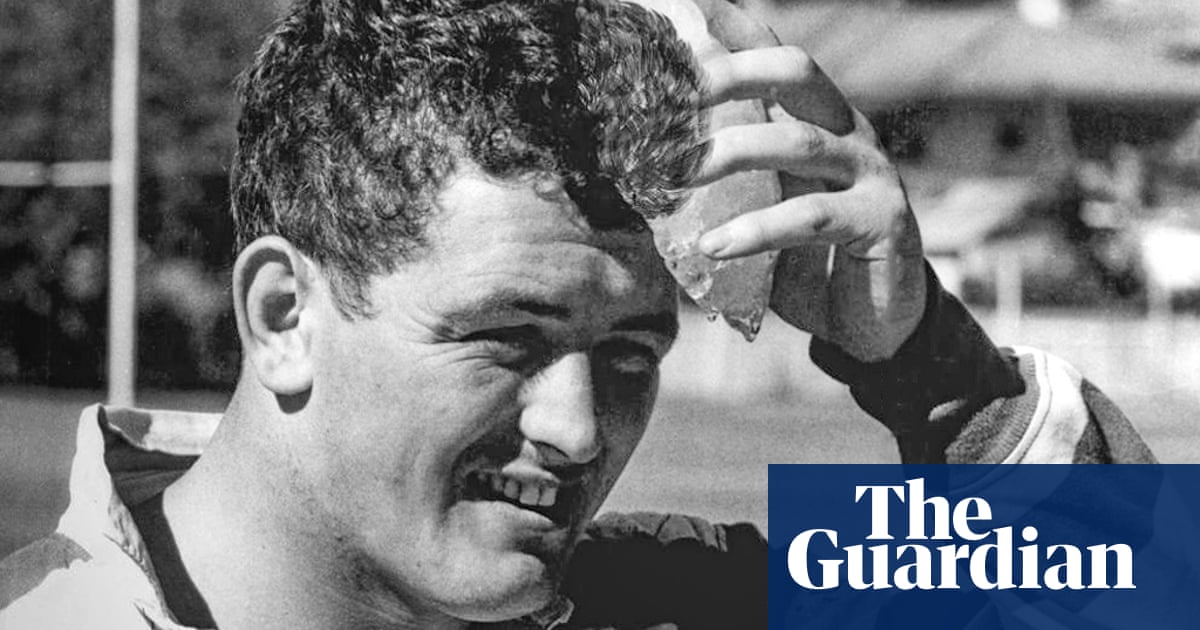Doug Laughton, who has died aged 80, was a member of the last Great Britain team to defeat Australia in a three-match Rugby League Ashes series in 1970. As a player he was also a two-time Challenge Cup winner.
However, he is possibly better known for his post-playing coaching career and his astute eye for spotting nascent talent. In three stints as coach of his hometown club Widnes he won every trophy available, tempting a host of big-name rugby union internationals to switch codes and move to Cheshire, where his formidable team became known as “the cup kings”.
Perhaps Laughton’s greatest coaching triumph came at Old Trafford in October 1989, when Widnes, playing the free-flowing style associated with all his teams, became World Club champions, overturning a 12-0 deficit to beat Canberra Raiders 30-18.
That team was a microcosm of Laughton’s ability to identify embryonic rugby league talent from beyond its usual geographical confines. He had spotted Martin Offiah playing in a rugby union sevens tournament for London-based Rosslyn Park, plucked him from obscurity and turned him into the most prolific English try-scoring wing of all time. Also playing in that side were the former Scottish rugby union back Alan Tait and, perhaps Laughton’s finest signing, Jonathan Davies.
The Welshman was his nation’s incumbent fly-half and a superstar of global rugby union when Laughton stunned the sporting world by paying a record £230,000 to bring him from Llanelli to Widnes. Many questioned the wisdom of the move, but via Laughton’s exemplary player-management Davies became the most successful of cross-code converts. These players, added to Widnes’s established league stars, such as Tony Myler, Kurt Sorensen and the Hulme brothers David and Paul, ensured a period of dominance lasting the better part of two decades.
Laughton was born in Widnes, one of five siblings. His father, Frank, was a factory worker, his mother, Margaret (nee Douglas), a homemaker. He went to Saints Fisher and More high school, where, although a keen swimmer, he became a house captain and was expected to play rugby league. He was not keen. “I thought this game is too hard,” he told his biographer Andrew Quirke in A Dream Come True (2003), “but my sports teacher persuaded me to keep turning up.”
The teacher was farsighted. Laughton began playing with the local amateur club St Paul’s and was spotted by St Helens who, in 1963, signed him for £500. Four years later Wigan paid £4,000 to take him to Central Park. There he made his mark as a tough but skilful loose-forward and also made his first Challenge Cup final appearance, Wigan losing 7-2 to Castleford in 1970. Despite the defeat, Laughton was selected for the Great Britain Lions tour to Australia. He played all three tests – scoring a try in the first – as Britain won the Ashes for the last time.
When Laughton was a boy, his neighbour had been Vince Karalius, a Great Britain international and a childhood hero of Laughton’s. Karalius, now Widnes coach, had long admired his former protege’s abilities and enticed him to his hometown club, as captain, in 1973.
It was the start of a golden era for Widnes. They won the league championship in 1978 and visited Wembley for the Challenge Cup final four times in five years, winning twice – against Warrington in 1975 and Wakefield Trinity in 1979 – by which time Laughton had become player-coach.
That latter year saw him crowned 1979 Man of Steel as the sport’s best player and culminated in his selection as captain on Great Britain’s tour to Australia. Unfortunately, his international career would end ignominiously. The Lions were heavily defeated in the first test and Laughton was dropped for the remaining matches. It was the last of his 15 Great Britain caps.
By now, though, a persistent knee injury was curtailing his playing career and he opted to focus full time on coaching. Two more Challenge Cup finals followed, the first, in 1981 against Hull Kingston Rovers, ending in victory. The Premiership trophy was also won in 1980, 1982 and 1983.
After an unexpected resignation in 1983, Laughton returned in 1986 and began scouring the ranks of rugby union for both hidden and overt talent. He would make clandestine trips to Wales to run his eye over potential signings. The day Davies penned his contract, Laughton was spotted in a pub by the Llanelli chairman Norman Gale, who sensed something afoot. Laughton and the Widnes director Jim Mills beat a hasty retreat, fearing a posse of Llanelli supporters might be summoned. Meanwhile, Laughton was undeterred, also securing the signatures of the Welsh union internationals John Devereux and Paul Moriarty.
Boosted by these adroit signings Widnes won two more league championships (1988 and 1989). They also won the Premiership trophy in those years, making it a hat-trick in 1990.
These were his last major successes. In 1991 he was lured to big-spending Leeds, where he continued to sign famous names from union including the New Zealand international Craig Innes and the rising English star Jim Fallon, and took the club to two losing Challenge Cup finals before returning to Widnes for a third time in 1996. However, dwindling finances meant he could not replicate earlier achievements and he retired in 1997 to concentrate on his plumbing business.
Laughton was married three times, his first marriage ending in divorce. His second and third wives predeceased him; he is survived by his five children.
